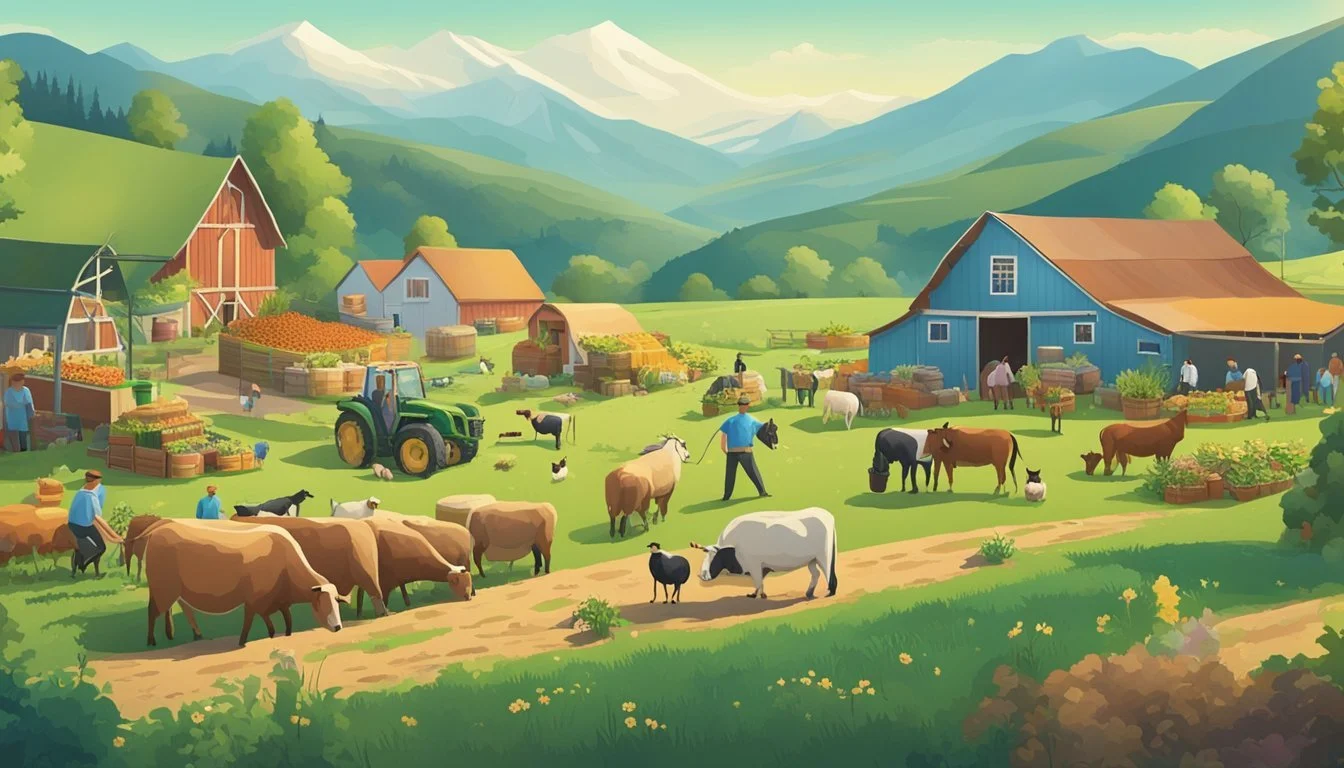Agritourism in Colorado
Exploring the Centennial State's Countryside Charm
Agritourism in Colorado has emerged as a vibrant intersection of agriculture and tourism, offering visitors a chance to experience rural lifestyle and agricultural processes firsthand. Across the state's varied landscapes, from the Great Plains to the Rocky Mountains, a multitude of Colorado farms have expanded their operations to include agritourism. This form of tourism allows visitors to engage with local food systems, understand farming practices, and participate in activities ranging from fruit picking to farm stays.
Colorado's agricultural heritage is rich and diverse, encompassing the cultivation of crops like hay and wheat, alongside raising cattle. Additionally, unique agricultural endeavors are present, with farms dedicated to producing specialty items such as mushrooms, sunflowers, bison (What wine goes well with bison?), and emu. This diversity adds to the appeal of Colorado agritourism, ensuring that there is a range of experiences catering to the interests of different visitors.
The economic impact of agritourism on the state is significant, contributing to farm income and offering a valuable revenue stream for local farmers. By welcoming tourists to their properties, farmers share the rural way of life and create a deeper connection between consumers and the origin of their food. Agritourism activities in Colorado not only support sustainable tourism practices but also enhance the preservation of farming traditions and the promotion of agricultural education.
Understanding Agritourism
Agritourism is an innovative agricultural practice that combines elements of the farming and tourism industries, providing a unique experience for those seeking to understand and appreciate rural life. In Colorado, this form of tourism has become a significant component of the state's economy, allowing visitors to explore and participate in farm and ranch activities.
In Colorado: Agritourism encompasses a range of experiences:
On-Farm/Ranch Activities: Visitors engage directly with agriculture on-site.
Food-Based Events: Culinary experiences that highlight local produce.
Heritage Activities: Learning about the region's agricultural history.
Colorado's diverse geography, from the flat farming lands in the East to the mountainous terrain in the West, provides an array of agritourism opportunities. One may find themselves taking part in a farm-to-table dinner in Erie, exploring a family-owned orchard, or even experiencing a day in the life of a rancher.
The agriculture-tourism synergy not only educates the public about farming practices but also contributes to the conservation of agricultural lands and the sustainable growth of rural communities. By fostering a direct connection between consumers and the origins of their food, Colorado's agritourism promotes a greater appreciation for the state’s agricultural heritage.
Advocates argue that these activities offer substantial benefits:
For Farms and Ranches: Diversify income and promote agricultural education.
For Tourists: Offer authentic rural experiences and education.
For Colorado: Enhances rural economies and supports conservation of landscapes.
Agritourism in Colorado reflects a commitment to sustainability and community, allowing visitors to participate in a lifestyle deeply rooted in the natural environment and agricultural tradition.
Key Destinations in Colorado's Agritourism
Colorado's agritourism offers a diverse array of destinations for visitors looking to connect with the state's agricultural roots. From serene farms and ranches to lush vineyards, these experiences allow tourists to immerse themselves in authentic and educational agricultural activities.
Erie's Contribution to Agritourism
Erie takes pride in its agritourism, cultivating a bond between farmers and visitors. Here, agricultural education and hands-on experiences take the forefront, allowing tourists to understand the farm-to-table process intimately.
The Role of Ranches and Farms
Ranches and dude ranches are integral to Colorado's agritourism, providing unique stays where guests can engage in ranching activities. Visitors can explore how ranchers manage livestock and the production of products such as meat, milk, cheese, and fiber.
Specialty Produce and U-Pick Farms
For those interested in agriculture’s more delicate side, u-pick farms across the state offer a chance to gather one’s fruits and vegetables. This hands-on approach not only supports local farmers but also educates visitors on the seasonal aspects of farming.
Wineries, Breweries, and Distilleries
Colorado's rich soil and favorable climate have given rise to a flourishing industry of wineries, breweries, and distilleries. Wine enthusiasts can embark on winery tours to taste and learn about the region's viticulture, while connoisseurs of crafted beverages can explore local breweries and distilleries.
Mountain Goat Lodge and Salida
Salida's Mountain Goat Lodge offers a glimpse into sustainable farming practices, with a focus on animal care. Visitors can learn about the production of milk, cheese, and eggs, all while enjoying the stunning scenery of the surrounding region.
Paonia's Agricultural Heritage
Paonia, a town with deep agricultural roots, showcases its heritage through its various orchards and vineyards. This area exemplifies how Colorado's agriculture can coexist with and enhance tourism.
Experiences and Activities
Agritourism in Colorado offers an extensive variety of hands-on and immersive experiences for families, tourists, and locals seeking educational, recreational, or simply relaxing agricultural encounters. Each activity provides a unique opportunity to explore the state’s rich rural heritage and learn more about farming and ranching in engaging environments.
Educational Workshops and Tours
Colorado's agritourism draws visitors with a variety of educational workshops and tours designed to deepen the understanding of agricultural processes. Participants can engage in training sessions that showcase sustainable farming practices and learn about livestock management. These tours often facilitate interaction with the farming community and encourage Coloradans and tourists alike to immerse themselves in the essence of rural life.
Mazes, Pumpkin Patches, and Exhibits
Especially during the autumn season, mazes and pumpkin patches offer a family-friendly outing where visitors can navigate through intricately designed corn mazes or pick the perfect pumpkin for their fall festivities. Various farms across the state host exhibitions that display local crops, agricultural techniques, and livestock, sharing the spirit of the harvest with the community.
Dude Ranch and Fishing Retreats
For those looking for a more adventurous experience, Colorado offers numerous dude ranch and fishing retreats. These establishments combine lodging with activities like horseback riding and fly-fishing, providing an authentic Western flavor to their stay. Rural lodges situated near streams offer serene settings for guests to relax and fish in the tranquility of nature.
Glamping and Farm Stays
Glamping and farm stays are ideal options for visitors who wish to experience the rural lifestyle without forgoing modern comforts. These retreats provide luxurious lodging amidst agricultural settings, allowing guests to wake up to the sounds of the farm and participate in daily farming activities at their leisure.
Hands-On Agricultural Work
Visitors interested in truly experiencing agricultural life can partake in hands-on agricultural work. Opportunities exist to assist with planting, harvesting, and caring for farm animals. This kind of participatory tourism offers a deeper understanding of where our food comes from and the importance of agriculture to the local economy and community.
Economic and Business Aspects
Agritourism presents significant economic opportunities for Colorado's rural agricultural businesses. It serves as a pivotal way for producers to diversify income and engage with the regional economy through innovative marketing and services.
Agricultural Businesses and Diversification
Agritourism allows agricultural businesses to diversify their operations by integrating recreational services which can significantly enhance their income. In 2017, it was reported that more than a thousand Colorado farms engaged in agritourism, collectively generating nearly $64 million in income. This diversification aids in stabilizing farm revenue and mitigating the inherent risks of traditional farming.
Marketing and Public Relations
Effective marketing and public relations strategies are crucial for agritourism providers. Promoting their offerings through various channels can attract tourists and local patrons alike. Many Colorado farms have taken advantage of the trend toward local and experiential travel, using traditional food marketing and community development as part of their PR strategies.
Resources and Training for Agritourism Providers
The Colorado Department of Agriculture and other entities provide resources and training aimed at the prosperity of agritourism. This includes helping businesses identify key factors that contribute to successful enterprises and offering guidance on navigating the agritourism industry's complexities.
Legal Aspects and Liability
Agritourism involves unique legal aspects and potential liabilities. It requires providers to be knowledgeable about state regulations and to ensure visitor safety on their premises. Collaboration with the Colorado Department of Agriculture can guide providers on liability issues, helping them to mitigate risks associated with agritourism activities.
Support and Partnerships
Agritourism in Colorado is bolstered by strategic partnerships and support from various organizations, fostering a vibrant intersection of agriculture and tourism for the region.
The Colorado Tourism Office and Promotion
The Colorado Tourism Office plays a pivotal role in promoting agritourism, highlighting the diverse experiences available across the state's scenic landscapes. They collaborate with agricultural businesses to market the Rocky Mountain region's unique offerings, including seasonal activities, fairs, and music festivals that showcase local culture and support farm and ranch enterprises.
The Colorado Department of Agriculture
The Colorado Department of Agriculture provides resources and support to farmers and ranchers seeking to enter the agritourism industry. By offering educational opportunities and outreach, the department empowers producers to diversify their economic strength through agritourism, linking America's agricultural heritage with tourism and community engagement.
Local and Community Involvement
Local county offices, Chambers of Commerce, and Visitor Centers are integral to agritourism partnerships in Colorado. These entities build community relationships and foster an environment where local events work in tandem with agritourism businesses. Community involvement ensures a cohesive approach to enriching the state's agritourism appeal and sustaining the agricultural industry.
Environmental and Cultural Impact
Agritourism in Colorado is not merely an economic activity; it's a practice deeply intertwined with the environment and culture. This balance of interests helps to ensure that while visitors enjoy Colorado's diverse agricultural landscape, they also contribute to the sustainable management of its resources and the celebration of its rich cultural heritage.
Sustainable Practices and Conservation
Colorado agritourism entities implement a variety of sustainable practices aimed at conservation. They typically focus on the following:
Water Usage: Effective water conservation measures are critical in Colorado, especially given the state's semi-arid climate. Agritourism initiatives often employ water-saving techniques such as drip irrigation and xeriscaping.
Land Stewardship: Protecting Colorado’s lands is a top priority. Agritourism helps by promoting farming practices that maintain soil health and preserve open spaces amidst the Rocky Mountains and other regions.
Environmental Education: Education is a cornerstone of agritourism, with many farms offering tours and programs that teach visitors about sustainable agriculture and the importance of environmental stewardship.
These efforts collectively aim at minimizing the impact on the environment while ensuring that agriculture remains a viable part of Colorado’s future.
Celebrating Colorado's Heritage and Culture
Agritourism also plays a pivotal role in celebrating and preserving Colorado's heritage and culture through:
Cultural Events: Farms and rural communities host events that showcase local history, traditions, and art—providing a platform for Coloradans to share their heritage.
Agricultural Heritage: By allowing visitors to experience farming firsthand, agritourism helps to educate the public about the state's agricultural roots and the importance of supporting local farms.
Connecting people to the land through educational experiences helps foster a deeper appreciation for Colorado’s cultural identity and environmental ethos.





